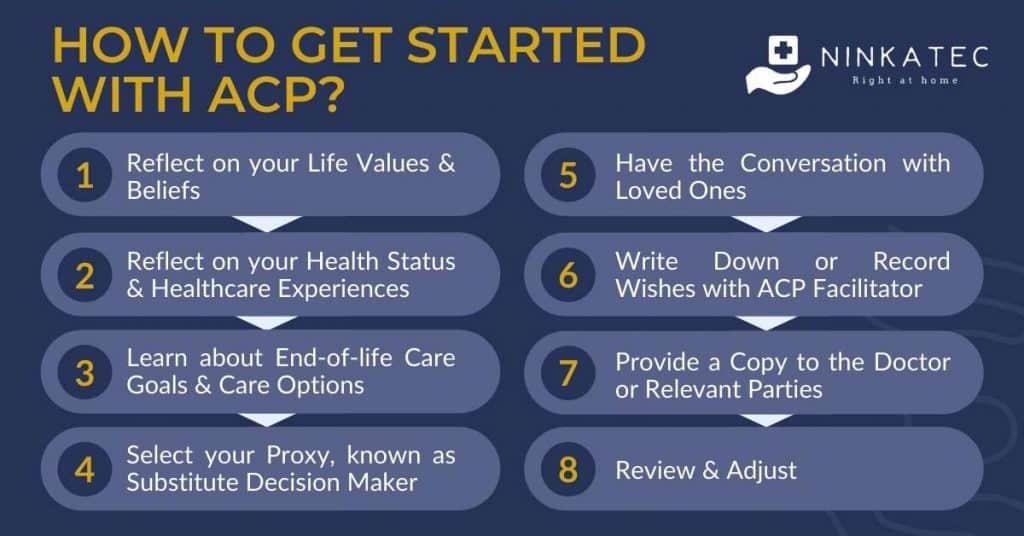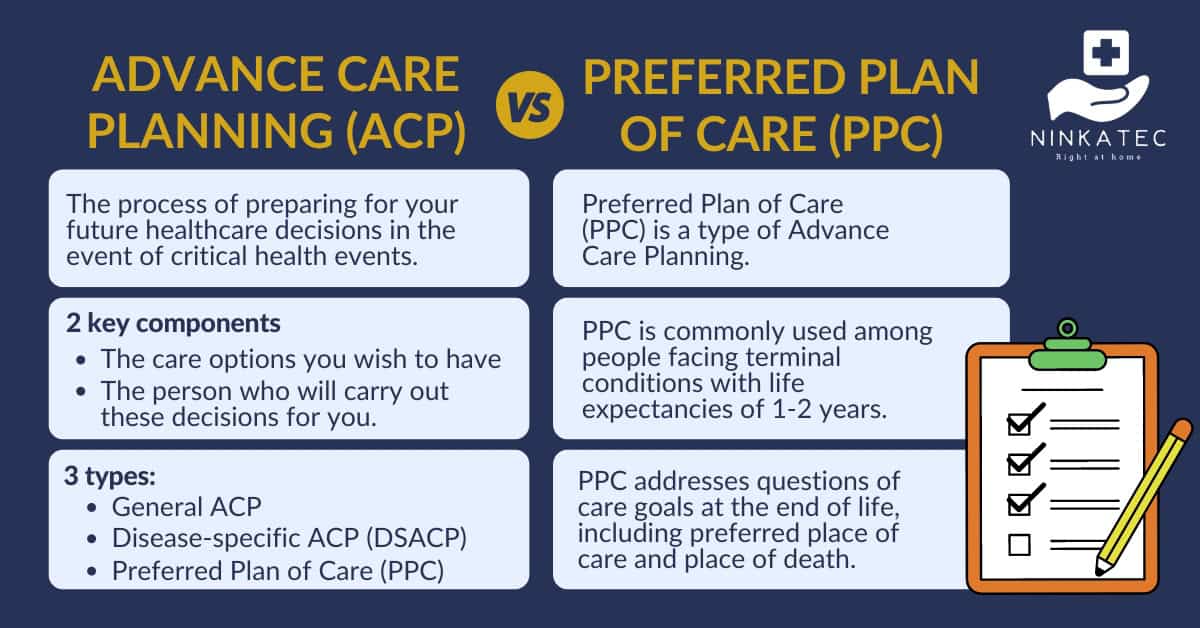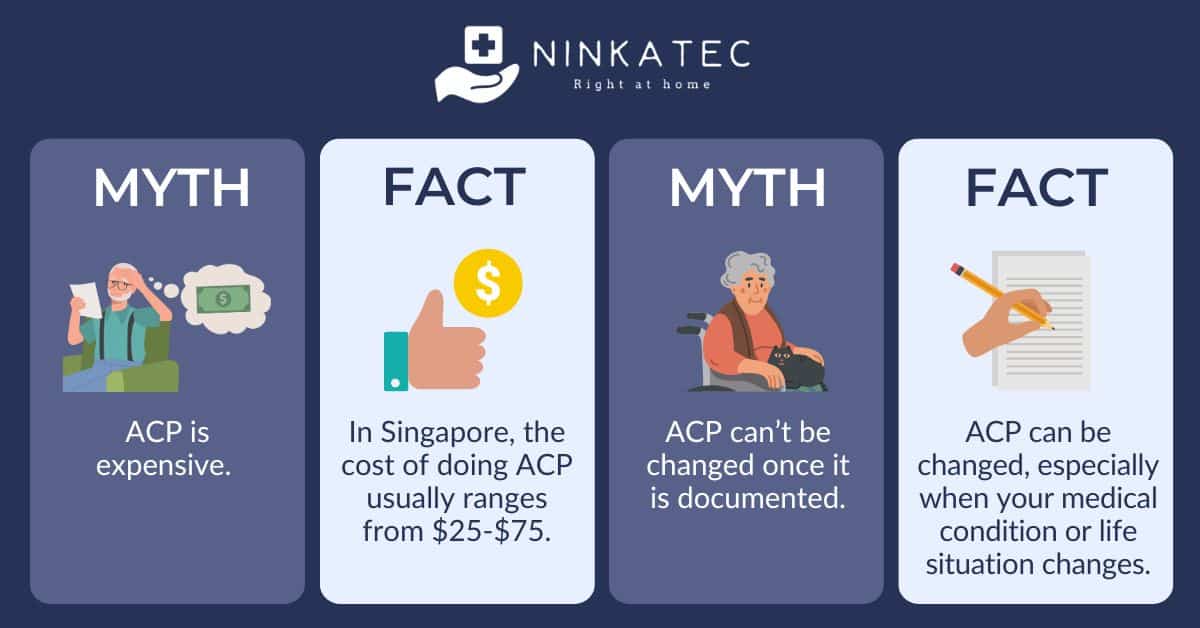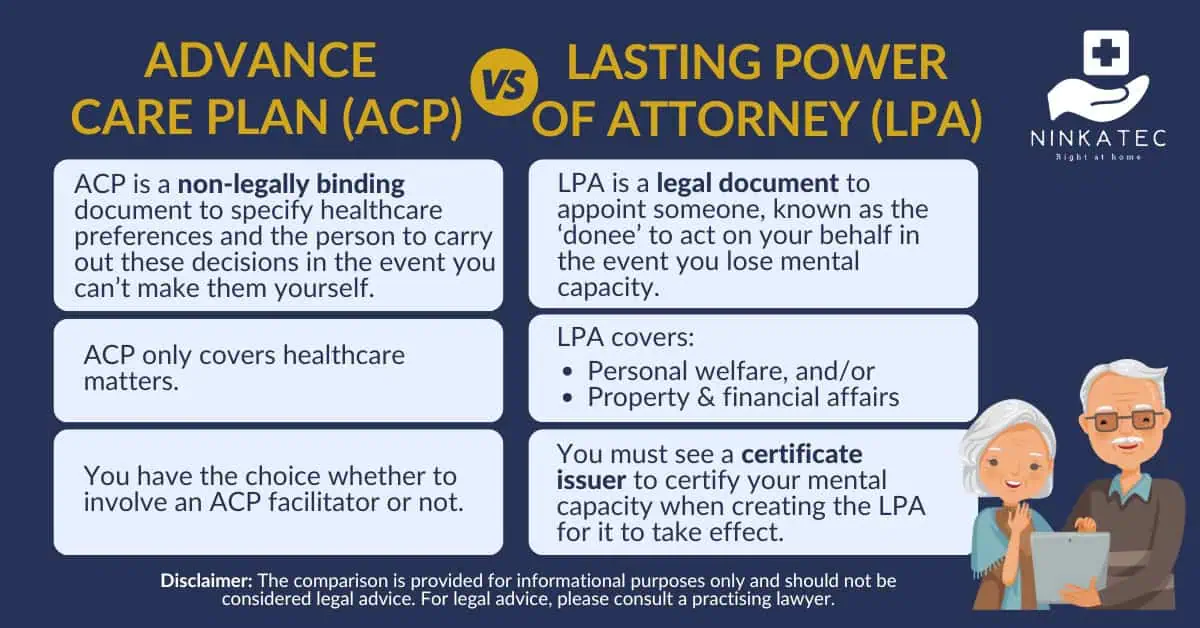Why would a healthy twenty-something consider a 'Living Will', or Advance Care Planning (ACP) as it is formally known. Contrary to popular belief, ACP isn't just for the elderly or the critically ill. An increasing number of young adults in Singapore are recognising the importance of having plans in place for unforeseen medical emergencies.
In this article, we go over key facts of Advance Care Planning and provide a step-by-step guide to help you navigate the process. Whether you're just starting to think about the future healthcare preferences for yourself or a loved one, or ready to formalise such plans, this guide is designed to provide you with the necessary information to make informed decisions.
Table of Contents
1. What is Advance Care Planning (ACP) in Singapore?
Advance Care Planning (ACP) is the proactive process of preparing for your future healthcare decisions, to ensure that you receive the care you desire in critical life events. It involves making arrangements when you are healthy and able about what you one, in the event you become seriously ill or injured and unable to make or communicate your desires.
If critical illness insurance protects your finances during medical crises, ACP ensures that your healthcare decisions during these difficult situations reflect your values and preferences, especially when you cannot voice them yourself. Although sometimes associated with elderly care planning, ACP is relevant and beneficial for people of all ages and stages of health. Indeed, like health insurance, it is better to get started when we are young and healthy.
It's important to acknowledge that ACP often elicits thoughts about end of life and death, which can be uncomfortable and even seen as taboo. But it is not the essence of the process. The ultimate purpose is to plan how you would like to live and get cared for till the last day of your life. For this reason, ACP is sometimes referred to as a 'Living Will.'
If you are assisting a senior loved one with ACP, you may find it challenging to initiate discussions about health issues. Yet, as many who have undertaken ACP will attest, engaging in these personal conversations with those you trust most can significantly strengthen and deepen your relational bonds. A useful tip is to approach your GP or family doctor to help spark the conversation, and continue with your loved one from there.
2. Key Content of an Advance Care Plan
Essentially, there are two key components to an Advance Care Plan:
- The care options you wish to have in critical situations.
- The person who will carry out these decisions for you, known as the Nominated Healthcare Spokesperson (NHS).
The first part involves reflecting on your values, experiences, preferences and learning about the various care options available. The second part requires selecting someone you trust to make decisions on your behalf and discussing your wishes with them.
There are numerous resources available to assist you with ACP, including free ACP forms and ACP booklets. This article is written to provide a comprehensive view of the steps involved, empowering you to make informed decisions about your healthcare. While it stands as a complete guide on its own, you may also find it beneficial to supplement this information with other online resources or seek guidance from a professional facilitator.
2.1. Step 1- Reflect on your Life Values & Beliefs
Living well and maintaining a good quality of life until our final days is a priority for many of us, and that is the core intention of ACP. It encompasses your emotional, spiritual, mental, and physical health, each of which holds different meanings for different people. So, the first question to consider is: What does living well until the end mean to you?
Does it mean being able to live independently? For some, independence signifies the preservation of dignity or the ability to continue contributing to family and community without feeling like a burden. Think about the importance of self-support for you, or ask yourself specific questions, such as how important it is for you to be able to care for yourself at home, making your own decisions, or participating in activities outside your home.
Does it mean being able to spend time with family and friends? Some people cherish family more than anything else and may wish to spend more time with loved ones. For them, life is worth living if they can be around family and friends. What about you?
Does it mean being able to enjoy your favourite pastimes and hobbies? Whether your hobbies are simple, adventurous, fun, or relaxing, deciding to spend your days doing what you love is a vital part of living well. While some activities may become challenging depending on your future condition, the goal is to accommodate as many as possible. Understanding this will make it easier for you to decide on care options later.
It is also helpful to consider what makes life not worth living for you. For some, losing the ability to interact with family makes life not worth it. For others, it could be losing the ability to care for themselves and becoming a burden to others. You can also turn to spiritual beliefs, or conversations with people you look up to and trust, for guidance during reflection. This step is deeply personal, and it’s important to take the time to think it through.
2.2. Step 2- Reflect on your Health Status & Experiences with Healthcare
In this step, consider your past healthcare experiences. Are there any personal experiences, such as visits to the ICU or caring for an ill family member, that might influence your future care preferences? Reflect on your thoughts and feelings during these times. Write down these reflections and any questions you have, as they will be valuable when working with an official ACP facilitator.
Additionally, review your current health status, as this can influence your decisions during the ACP process. Generally healthy adults might only need general ACP, but it is also useful to consider potential future health risks. For example, people at risk for or with active diagnoses of progressive conditions like cancer, dementia, or stroke might find Disease-Specific ACP more relevant. This is where your family doctor or GP can offer valuable support. They can help you better understand your health condition and its potential impact on your life, making ACP more manageable and personalised for you.
2.3. Step 3- Learn more about End-of-life Care Goals & Care Options
In Singapore, there are three common types of ACP, each corresponding to different health statuses:
- General ACP: This type is suitable for any adult or elderly person who is generally healthy and mentally sound. It covers basic healthcare preferences for unforeseen medical situations.
- Disease-Specific ACP: This type is appropriate for adults or seniors with chronic, deteriorating conditions, such as organ failure or untreatable cancers. Treatment preferences depend on the specific disease and possible complications, encompassing a range of scenarios from low to high risk. Disease-Specific ACP should be done in consultation with a doctor familiar with the patient’s medical situation and in the presence of the Nominated Healthcare Spokesperson, as it is often more complex than general ACP.
- Preferred Plan of Care (PPC): This plan addresses end-of-life care situations for patients facing terminal illness with life expectancy of 1-2 years. It addresses questions about care goals and medical interventions to achieve such goals, including the use of CPR or a ventilator. PPC also explores the preferred place of care at end of life and the place of death.
It can be challenging to think about end-of-life care if you haven't experienced it in your family. You can start by doing online research to broaden your knowledge and perspective. Here are relevant articles we publish on our blog:
- Home care or nursing home - How to weigh your options
- Planning your healthcare needs in the golden years - What you need to know
- Palliative care at the end of life - How Singaporeans' attitude towards end of life care is changing
2.4. Step 4- Determining who will make Decisions if you become Incapacitated
An essential part of ACP is to identify and appoint a 'proxy,' officially known as a Nominated Healthcare Spokesperson (NHS). In this step, you need to select someone you trust to carry out your wishes and make decisions on your behalf when you are incapacitated (i.e., unable to make decisions yourself). This person is typically a family member or caregiver, but other options include a friend, legal representative, or religious advisor. Involving this person early in the process allows them to ask questions and gather additional details.
In Singapore, the person you appoint should meet the following requirements:
- Be above 21 years old
- Be willing to speak on your behalf
- Know you well and understand your wishes and concerns
- Be able to communicate your care preferences to your doctors
- Be able to follow through with your care preferences
2.5. Step 5- Having the Conversation
For some people, this is considered the most challenging part of the process. Talking about end-of-life care or elder care needs when one is still young and healthy can be uncomfortable. Cultural practice may even consider it taboo, making the conversation even more difficult. Here are some considerations that can make it easier to communicate your plan to your potential proxy:
- Find a good and relaxing time to let this person know you are thinking about nominating them as Nominated Healthcare Spokesperson for your ACP.
- Explain to the person why you selected them.
At the end of the discussion, they should understand that while it is an honour to be trusted, it is also a massive responsibility. Knowing this, you should also exercise some consideration if the person wants to take time to think about it or eventually back out.
Once he/she agrees to be your Nominated Healthcare Spokesperson, ensure you involve the person in the rest of the ACP discussions. Being part of the discussion is beneficial to both you and your appointed NHS.
2.6. Step 6- Writing Down or Recording Wishes
At this point, you might want to involve an ACP facilitator to ensure you are not missing anything. An ACP facilitator is usually someone certified to help individuals, their families and their loved ones through the ACP process. Alternatively, you can choose to document your ACP within the family with the Nominated Healthcare Spokesperson.
Writing down or recording your wishes is highly recommended because it could be years before your ACP is needed. Having only a verbal arrangement could mean that certain details might get forgotten, especially during a healthcare crisis when ACP is required.
In Singapore, you can look for and schedule a face-to-face or online meeting with a certified ACP facilitator here. You also have the option to upload your ACP to National Electronic Healthcare Record (NEHR) for easy access by healthcare professionals when it is needed. ACP facilitation may be free or cost a small fee, make sure you check with the facilitator before booking.
ACP vs LPA (Lasting Power of Attorney)
It's important to note that while writing down your wishes is crucial, the document is not a legal document. ACP is not a legally binding process. However, you can make certain parts of your plan legally binding. For example, you can nominate a 'proxy' to oversee financial arrangements and decisions, such as handling your bank account, property, and other financial matters, through a document called Lasting Power of Attorney (LPA). This allows the proxy, legally known as the 'donee', to act on your behalf in matters such as withdrawing from your bank account and making payments for medical expenses.
LPA is recommended for everyone and is particularly important for patients suffering from dementia, as mental incapacitation is almost guaranteed.
Ninkatec provides LPA certification at home, which can benefit people with mobility challenges. Learn more about our LPA service here.
ACP vs AMD (Advance Medical Directive)
Another ACP-related legal process is the Advance Medical Directive (AMD). This is a legal document that a person signs in advance, stating that in case of a terminal illness, they do not want excessive treatment to prolong life. You can refer to the official AMD form provided by the Ministry of Health (MOH).
In Singapore, you can visit any accredited medical practitioner to complete an AMD. The process also involves a witness, who can be a nurse or an assistant at the doctor’s office. If you prefer to bring your own witness, the person must be someone without any vested interest in your demise. Once the AMD is completed, it must be submitted by post to the Registrar of Advance Medical Directives for it to take effect.
2.7. Step 7- Provide a Copy to the Doctor or Relevant Parties
After completing the ACP process and creating your documents with your proxy, lawyer, ACP facilitator, or doctor, it is advisable to share copies with your Nominated Healthcare Spokesperson, doctor, relevant family members, and caregiver. Doing so ensures that everyone involved in your well-being understands your wishes, making it more likely that they will be respected.
2.8. Step 8- Review & Adjust
ACP is an ongoing process that should be reviewed regularly, especially when your medical condition or life situation changes. One should not be afraid to make changes to give ourselves an opportunity to live more comfortably. Ask for clarifications and make changes at any time to better suit your needs.
We hope the above guide is helpful. There are many ACP starter forms on the internet that you can use to begin the process. You can also talk to your doctors or ACP facilitator at any restructured hospitals in Singapore for guidance and advice. Do it for yourself then help your family members and elderlies break the taboo and do it as well. Remember, it is a ‘Living Will’.














